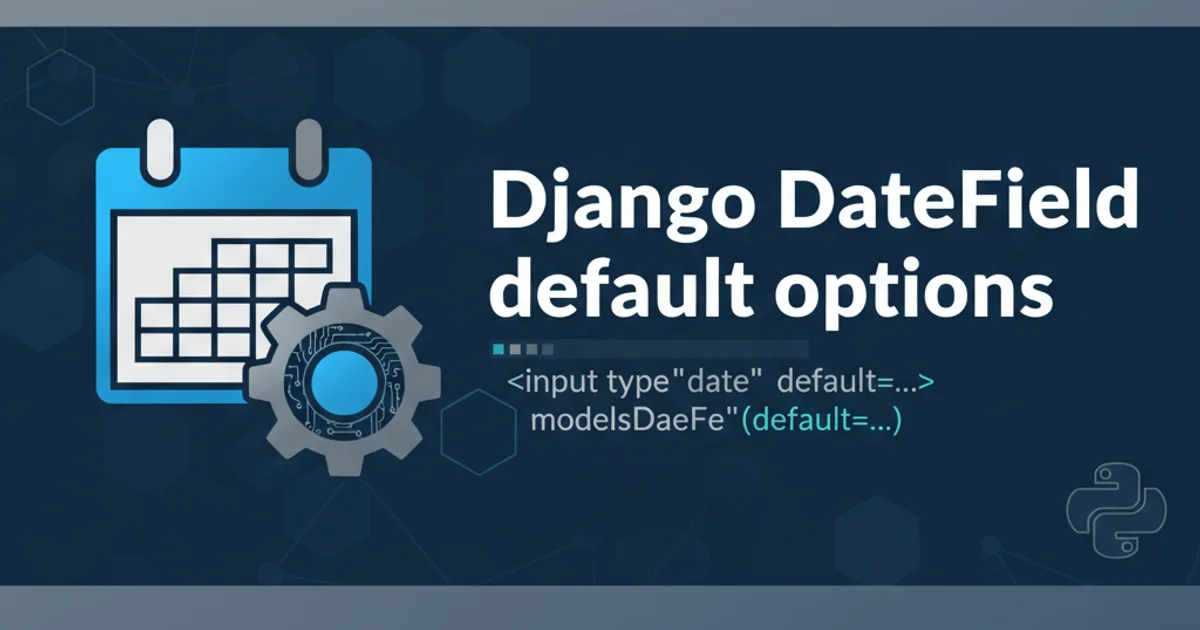Django DateField default options
Categories:
Mastering Django DateField Defaults: A Comprehensive Guide

Explore the various ways to set default values for Django's DateField, including dynamic defaults, auto-population, and common pitfalls to avoid.
Django's DateField is a fundamental model field for storing dates. While often straightforward, setting appropriate default values can sometimes be tricky, especially when dealing with dynamic requirements like 'today's date' or 'the moment of creation'. This article delves into the different strategies for defining default options for DateField in your Django models, ensuring your data is consistently and correctly populated.
Understanding Basic DateField Defaults
The simplest way to provide a default value for a DateField is to pass a datetime.date object directly to the default argument. This is suitable for static, unchanging default dates. However, for dynamic defaults, you'll need a different approach.
from django.db import models
import datetime
class Event(models.Model):
name = models.CharField(max_length=100)
# Static default date
start_date = models.DateField(default=datetime.date(2023, 1, 1))
end_date = models.DateField(null=True, blank=True)
def __str__(self):
return self.name
Defining a DateField with a static default date.
datetime.date.today() directly in the default argument like default=datetime.date.today(). This will evaluate the function once when the model file is loaded, not each time a new object is created. As a result, every new object will have the same default date: the date the server started.Dynamic Defaults: Using Callables
For dynamic defaults, such as setting the current date, you should pass a callable (a function) to the default argument. Django will execute this callable every time a new model instance is created without explicitly providing a value for that field. The most common callable for DateField is datetime.date.today (without parentheses).
from django.db import models
import datetime
class Task(models.Model):
title = models.CharField(max_length=200)
# Dynamic default: current date when object is created
created_on = models.DateField(default=datetime.date.today)
due_date = models.DateField(null=True, blank=True)
def __str__(self):
return self.title
Using datetime.date.today as a callable for a dynamic default.
flowchart TD
A[Model Instance Created] --> B{Is 'created_on' provided?}
B -- No --> C[Call datetime.date.today()]
C --> D[Assign result to 'created_on']
B -- Yes --> E[Assign provided value]
D --> F[Save Model]
E --> FFlowchart illustrating how default=datetime.date.today works during model instance creation.
Auto-Populating Dates: auto_now_add and auto_now
Django provides two special arguments for DateField (and DateTimeField) that automatically manage date population:
auto_now_add=True: Automatically sets the field's value to the current date when the object is first created. It cannot be changed afterwards.auto_now=True: Automatically updates the field's value to the current date every time the object is saved. This is useful for 'last modified' timestamps.
from django.db import models
class Article(models.Model):
title = models.CharField(max_length=255)
content = models.TextField()
# Set once on creation
published_date = models.DateField(auto_now_add=True)
# Updates every time the article is saved
last_modified = models.DateField(auto_now=True)
def __str__(self):
return self.title
Using auto_now_add and auto_now for automatic date management.
auto_now_add=True or auto_now=True are automatically set by Django and are not editable in forms by default. If you need a field that defaults to the current date but can also be manually overridden, use default=datetime.date.today instead of auto_now_add.Custom Default Functions
You can also define your own custom functions to generate default dates. This is particularly useful if your default logic is more complex than simply today or if you need to perform calculations based on other factors.
from django.db import models
import datetime
def default_delivery_date():
# Example: Default delivery is 7 days from today
return datetime.date.today() + datetime.timedelta(days=7)
class Order(models.Model):
order_number = models.CharField(max_length=50, unique=True)
order_date = models.DateField(default=datetime.date.today)
# Custom default function for estimated delivery
estimated_delivery = models.DateField(default=default_delivery_date)
def __str__(self):
return self.order_number
Implementing a custom function for a dynamic DateField default.